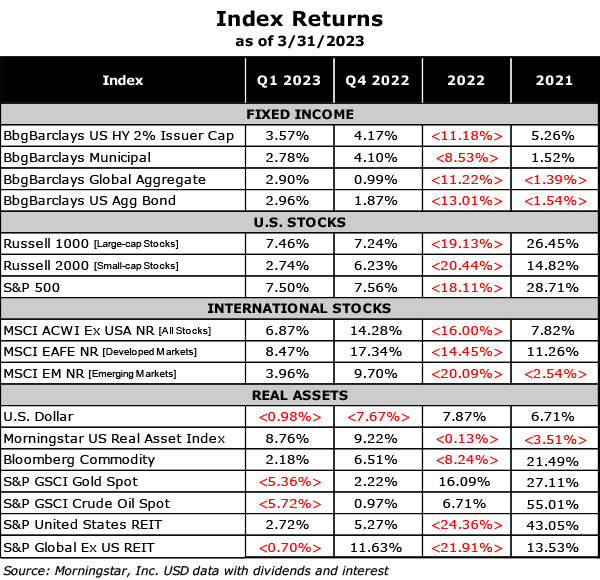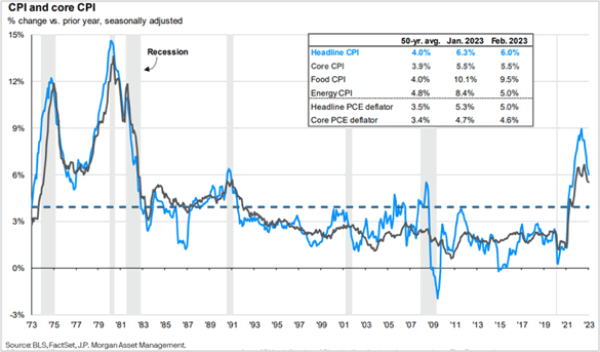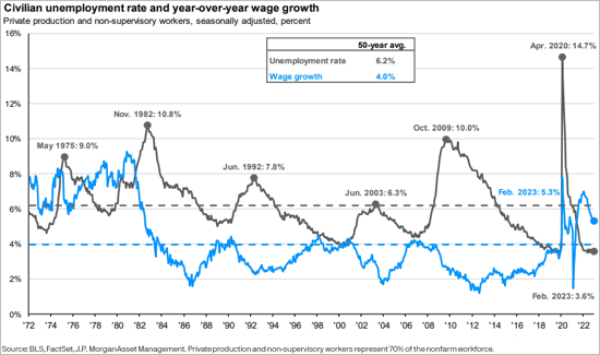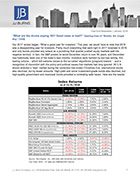“Send lawyers, guns, and money / Dad, get me out of this” Warren Zevon, “Lawyers, Guns and Money”
U.S. investors breathed a sigh of relief in the first quarter as bonds and stocks started the year with a strong January, then powered through some bad inflation and banking sector news to finish the quarter in positive territory. Foreign stock markets, despite facing similar headwinds as the U.S., posted very strong results, aided by the weakening U.S. dollar. China’s relaxation of its strict COVID policies was welcomed by investors and consumers alike, as many Central Bankers are fighting inflation pressures similar to those bedeviling the U.S., though a relatively mild winter helped contain energy prices and demand. Oil and gold declined on economic news and recession fears. U.S. REITs, coming off a punishing year in 2022, staged a mild rebound as attractive valuations and expectations of a peak in interest rates initially settled the market in January. February’s inflation print and March’s banking-sector issues caused some unease, severely affecting Office REITs on concerns over future financing. Concerns remain over the Fed’s path of rate hikes – when WILL they end? – and yes, still, a possible recession. Slowing growth usually prompts Fed action in the form of lower rates, so the clash of these conflicting scenarios might prove quite volatile. Recent results are in the table below:

“In every life we have some trouble / But when you worry you make it double / Don’t worry, be happy” Bobby McFerrin, “Don’t Worry, Be Happy”
There are numerous issues on the markets’ ‘wall of worry’ that we follow. They range from low-burning issues such as the ongoing COVID 19 epidemic (yes, it’s still with us) to what we see as the ‘hottest’ issue, fears of a U.S.-led global recession. Some economists’ estimates project the lowest global-growth rate in many years, the result of higher global interest rates, stubborn inflation and a lower growth-plateau in China. The U.S. Fed has remained steadfast in their determination to cool inflation to their preferred target of 2%, and their preferred method of pushing prices down is raising interest rates. The FOMC is also willing to cause a ‘mild’ recession – their words – in the continuing inflation fight, arguing that high long-term inflation is more harmful to the economy than a brief near-term slowdown. The graph below demonstrates recent 50-year inflation history and the challenge the Fed is facing:

Naturally, there are a variety of arguments as to why inflation remained low for most of the period following the Global Financial Crisis. A strong case is that globalization and China’s role in exporting disinflation in goods were strong contributors to this welcome consumer trend. Cheap debt financing and slow wage growth also contributed to low U.S. domestic inflation post-GFC.
“Casey Jones you better, watch your speed / Trouble ahead, trouble behind / And you know that notion just crossed my mind” Grateful Dead, “Casey Jones”
One of the challenges facing the Fed is managing the pace of their inflation-fighting rate hikes. Chair Powell has acknowledged that wage growth is one statistic the FOMC is carefully watching as they believe it to be a key contributor to sticky inflation. The graph below demonstrates that wage growth is starting to decelerate, even as the job market remains hot. It is a disappointment to note that the best wage-growth numbers in decades are being deliberately reined in, particularly in the face of dropping inflation leading to positive real-wage growth (wage growth higher than inflation). If these two data concepts are related as the Fed believes and wages and the job market don’t cool fairly rapidly, the Fed may be forced to maintain higher rates longer than anticipated.

This suggests the analogy of two trains, one eastbound (rate hikes) and one westbound (recession), both traveling on the same track at high speeds. A catastrophe (severe recession?) seems imminent unless a switch is thrown to move one train to a new side track (no recession). Given the persistence of some stickiness in housing data, this might bring the two trains very close to one another before the switch is thrown and one train (ideally recession) runs in a different direction.
“The next stop that we make will be soon / Tell all the folks in Russia, and China, too / Don’t you know that it’s time to get on board / And let this train keep on riding, riding on through” The O’Jays, “Love Train”
Several years ago, we heard Michael Bloomberg at Bloomberg Invest New York comment that markets will periodically correct and rebound “as usual.” We agreed, but it’s his follow-on observation has stuck with us ever since: “What overnight event will cause markets to decline that has always been out there?” One issue that we find troublesome is the increasing tensions with Russia and China. Russia’s invasion of Ukraine is going to be a long war of attrition, likely destroying much of the country and causing disruption in global markets for some time. China’s economy is slowing to levels not seen in some years (excluding the COVID pandemic) and is facing pressures both within and from without the country. The U.S. set export controls last fall meant to restrict China’s ability to access certain U.S. semiconductors, thus hampering China’s economic and military development. Russia and Belarus are also subject to U.S. technology restrictions. While these are difficult decisions, imposed on these countries for different reasons, they represent a potential severe technology-development handicap. These embargoes represent pressure on nations that are facing serious internal challenges. As territorial expansions and outright war continues, our concern is escalating rhetoric as economic pressures have mounted. In these troubled times, we think that much deeper investment in diplomacy and trade policy would be wise investments. Having a strong and vibrant domestic economy is also a great defensive policy, according to Robert Gates, former Secretary of Defense to two presidents.
Despite the gloomy data and geopolitical tensions, we mentioned, we still see a partial ‘silver lining’ in the economic clouds. At the Bloomberg Invest New York referenced above, former Bond King Bill Gross noted that “optimism is a force of capitalism.” We still see a strong post-pandemic job market, strength in our financial system, declining (though not vanquished) inflation, decent equity earnings, unprecedented strength in many state-and-municipal balance sheets, and ultimately a return to rational capital markets buttressed by higher interest rates. Corporations still have healthy balance sheets and interest coverage, supply-chain delays are a distant memory and producer input prices are falling.
This does not imply that there is only smooth sailing ahead. We still expect turbulence in equities due to weakness in future-quarters’ earnings, interest rates still need to ‘settle,’ house prices and financing need a recalibration and commercial real estate is undergoing some profound changes due to the changing work environment. Author J.A. Shedd once noted that, “A ship in harbor is safe, but that is not what ships are built for.” Our portfolios are designed to weather fair winds (bull markets) and storms at sea (loss harvesting and rebalancing). Last year was a difficult but necessary recalibration of markets after 15 years of unsustainable market conditions. The Fed, after some rocky sailing, will eventually change course and steer with the trade winds.
As always, we urge our clients to focus on their long-term plan and not allow short-term market events to derail them. If there is a short-term goal that needs to be funded, that cash should be set aside in anticipation of the withdrawal from the portfolio. If you have invested long enough you know that the market tide will ebb and flow, but diversification allows portfolios to weather the storm. If you have any questions, feel free to contact our office.
– Your Wealth Management Team at JJ Burns & Company
Download Market Commentary
Disclosure: J.J. Burns & Company, LLC is a registered investment adviser with the U.S. Securities & Exchange Commission and maintains notice filings with the States of New York, Florida Pennsylvania, New Jersey, Connecticut, Georgia, Illinois, North Carolina, and California. J.J. Burns & Company, LLC only transacts business in states where it is properly registered, or excluded or exempted from registration. Follow-up and individualized responses to persons that involves either the effecting or attempting to effect transactions in securities, or the rendering of personalized investment advice for compensation, as the case may be, will not be made absent compliance with state investment adviser and investment adviser representative registration requirements, or an applicable exemption or exclusion.
All investing involves risk, including the potential for loss of principal. There is no guarantee that any investment plan or strategy will be successful.
The foregoing content reflects the opinions of J.J. Burns & Company, LLC and is subject to change at any time without notice. Content provided herein is for informational purposes only and should not be used or construed as investment advice or a recommendation regarding the purchase or sale of any security. There is no guarantee that the statements, opinions or forecasts provided herein will prove to be correct.
Past performance may not be indicative of future results. Indices are not available for direct investment. Any investor who attempts to mimic the performance of an index would incur fees and expenses which would reduce returns.
Securities investing involves risk, including the potential for loss of principal. There is no assurance that any investment plan or strategy will be successful.


